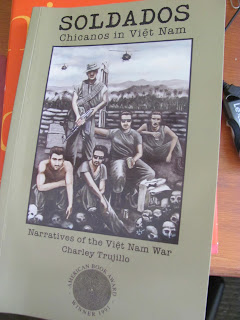 |
| Soldados: In their own words |
Saturday,
June 18th, Tia Chucha’s Centro Cultural and Bookstore, in Sylmar, CA.
hosted Chicano writer, publisher, and filmmaker, Charley Trujillo. A couple of weeks
earlier, Charley and I sat down in an El Segundo coffee shop to catch up on old
times, except, as the audience at the Tia Chucha’s learned, Charley prefers to
look forward, always following the headlights in front, his newest projects,
rather than the darkness behind.
Charley spoke about his evolution as an
artist and businessman, from writing his first non-fiction book Soldados, his
novel Dogs from Illusion, his Chusma House Press and upcoming releases, a successful
PBS documentary based on his book, Soldados, and various online lectures, like
Tiburcio Vasquez and topics as diverse as ethnic studies, but what he really wanted to talk about was
his newest endeavor, a full-length movie, Dogs from Illusion, inspired by his
books, the Vietnam War itself, and the real life experiences of Chicanos in Southeast
Asia where, he said he left part of himself, figuratively and literally.
Charley suffered serious wounds, losing an
eye in combat. Like many soldiers during the war, he didn’t think he was ever coming
home, but he did, and he knows his movie is different than other Vietnam and war movies because of his multi-ethnic cast, with Chicanos in the lead, and a Vietcong woman, based
on a true character, in a key role. Charley's wants the audience to see Vietnam through a Chicano point of view, for the first time.
During Q & A, he talked about his post-war
journey, traveling the world, something of a vagabond, graduating from U.C. Berkeley and San Jose State, teaching, writing,
and publishing. He told the audience how he noticed, early on, that books and
movies about Vietnam completely ignored Chicanos, except for a few movies, stereotypical
cameos of timid Chicano soldiers holding their rosaries or praying to makeshift
altars.
The reality was much different than the media’s
fantasy. Chicanos face the enemy head on, and they came home in body bags, or wounded, in greater numbers than
other groups in proportion to their population in the U.S. In all branches,
Chicanos played major roles in the war, many highly decorated, like Roy Benavides and Everett Alvarez, leading as well
as following, protagonists and heroes, nothing like the books or movies portray them.
So, Charley set out to compose his first book Soldados, interviews with Chicano
Vietnam veterans from his hometown of Corcoran, California, located in the San Joaquin
Valley.
Charley talked about the irony of Chicano
farmworkers going off to Vietnam to fight a war against Vietnamese farmworkers,
who made up the bulk of the V.C. guerilla forces, a theme he addresses in his
movie, as well. He didn’t need to go far to find Vietnam veterans to interview. In Corcoran,
alone, a population of less than 12,000 in the 1970s, he found nearly two dozen Chicanos who
had gone to Vietnam, and not all of them were gung-ho machistas.
He asked one veteran, “Were you drafted, or
did you join?” And a typical raza answer, “(Laughing) Shit!
That’s a stupid question. I was drafted,” or the way Manuel Lemus answered, “I
was drafted in November of 1967. This was the cotton-picking season in
Corcoran.” David Delgado admitted, “I stayed about five days at the San
Francisco International Airport. I lived up there at the USO lounge. I couldn’t
make up my mind whether I should go to Canada or not.” Then there was Herbert
de la Fuerte, “Me and Manuel Gonzalez went to the induction center for our physical.
Manuel told me that he had gone to a curandera and she was going to help him out
and not pass the physical. I passed, and he didn’t.”
After he finished his book, Charley
submitted it to numerous publishers. All turned him down. He said he realized,
like so much else in his life, if he wanted to get it done, he’d have to do it himself.
So, he created Chusma House Books, Soldados his first publication. He became one-man
publicity machine and travelled to read and sell books wherever he was invited.
There were Chicano veterans and their families throughout the country who
wanted to know about Chicanos in Vietnam. They all scooped up his book. Soldados went on to win Chusma House
and Charley the prestigious American Book Award, an honor bestowed on a book by
other writers for “outstanding literary achievement.”
After finishing his screen play, he approached
Hollywood with the script. They either showed no interest, or they wanted him
to change the screen play dramatically. Again, he realized, if it was going to
get done, he’d have to do it himself. The intrepid writer-entrepreneur is hard
at work raising funds for his movie, a tic tik tok campaign already gathering
500,000 followers. The trailer to Dogs of Illusion is available at his website
Chusmahouse.com, along with information about his book, lectures, and awards.
Charley has published a new edition of Soldados, and all proceeds will go to
the film's production, which he is completing with Falcon Films, and documentary filmmaker Art
Cervantes.
Chusma House Press has established it reputation and published such noted Chicano writers as Jose Montoya (In Formation, 20 Years of Bola), Jose Antonio Burciaga (Undocumented Love), Patricia Gonzalez (The Mud People), the soon-to-be released Barrio Girl Goes to Europe, by Sonya Fe, and the poetry of Gloria Velasquez.
Also on Charley’s docket is an anthology, Chicano Masculinity:
Vatos, Warriors, and Pendejos, where he will encourage writers, both male and
female, to submit work exploring the Chicano male as more than the stereotypes American
society has cast on him, especially the beer-guzzling, womanizing machistas.
Thirty years ago I used this book in my Masters program at University of Colorado—Denver. The author actually let me interview him on the phone. I earned an A on my academic paper. I loved this book and will order another for my son.
ReplyDelete